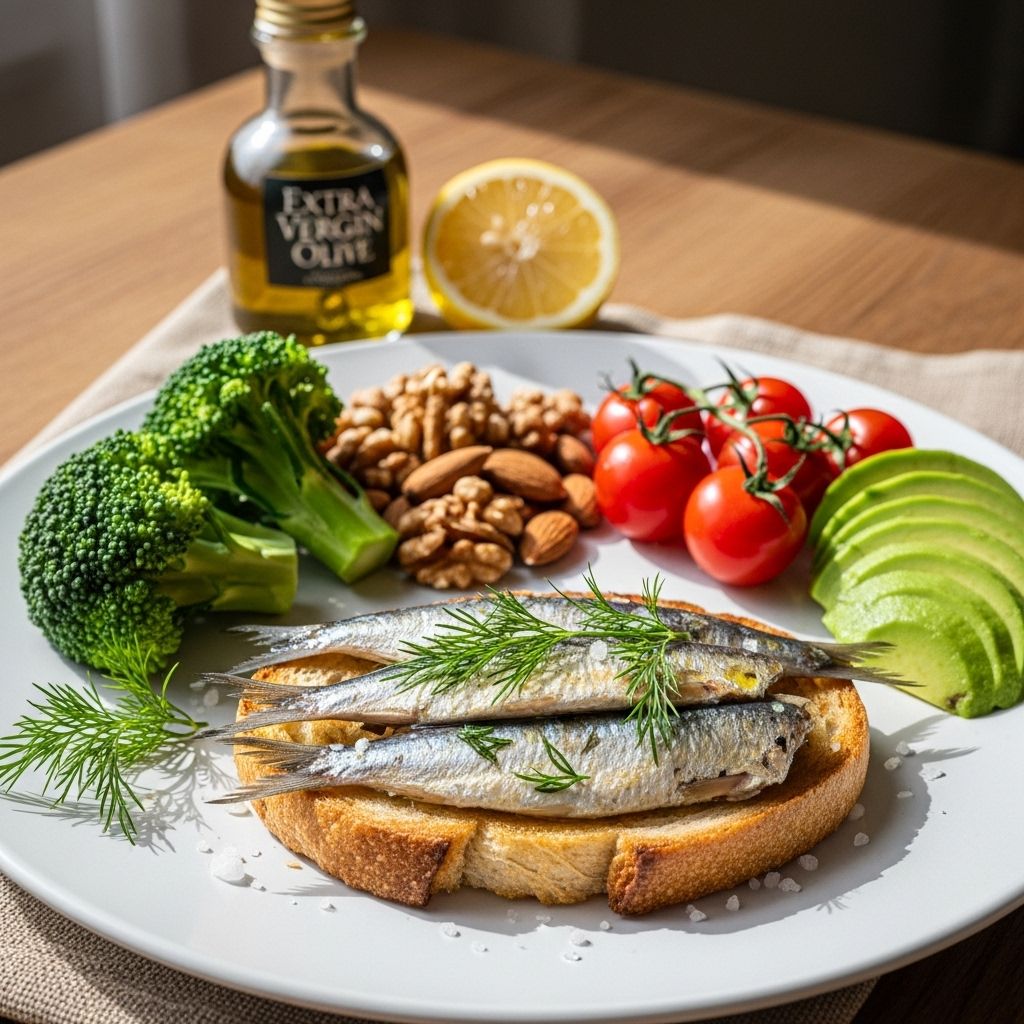Are Sardines Healthy? Nutrition, Benefits, and How to Eat Them
Small, budget-friendly fish deliver essential omega-3s, calcium, and protein.

Are Sardines Healthy? Expert Insights on a Tiny Fish with Big Nutrition
If you’re looking for a simple way to boost your diet with high-quality protein, vital nutrients, and healthy fats, sardines should be on your radar. These small, silvery fish have a long history as a budget-friendly food, but recent nutrition research and sustainability concerns have thrust sardines into the spotlight as one of the best seafood choices you can make. But what exactly makes sardines so healthy, and how can you enjoy their full benefits? Let’s explore the complete evidence-based guide to sardines, from their nutrients to practical eating tips.
What Are Sardines?
Sardines—sometimes called pilchards—are small, oily fish that usually measure fewer than six inches long. They belong to the same family as anchovies and herring, and can be purchased fresh, frozen, or canned. The canned version is the most common and often the easiest to find, available packed in olive oil, brine, water, mustard, or tomato sauce. Sardines are enjoyed all around the world, either on their own, in salads, or as part of hearty recipes.
Types of Sardines Available
- Fresh sardines: Found seasonally at seafood markets; require cleaning and preparation.
- Canned sardines: Widely available, convenient, and versatile; eat straight from the tin or add to recipes.
- Skinless/boneless options: Particularly good for those new to sardines, but remember that the tiny bones are soft and edible, providing extra calcium.
Nutritional Breakdown of Sardines
Sardines pack a significant nutritional punch for such a small fish, offering robust amounts of protein, omega-3 fatty acids, calcium, selenium, and vitamin D. Their micro-nutrient content can vary slightly depending on whether they’re fresh or canned and what they’re packed in.
| Nutrient | Amount |
|---|---|
| Calories | 208 |
| Protein | 24.6g |
| Total Fat | 11.4g |
| Omega-3 Fatty Acids | ~2g |
| Cholesterol | 142mg |
| Calcium | 382mg |
| Iron | 2.9mg |
| Vitamin D | 4.8µg |
| Vitamin B12 | 8.9µg |
| Potassium | 397mg |
| Sodium | 307mg |
| Carbohydrates | 0g |
| Sugar | 0g |
In addition to these nutrients, sardines are a good source of potassium, phosphorus, magnesium, selenium, B vitamins (including niacin and riboflavin), vitamin A, and vitamin E.
Top 6 Health Benefits of Eating Sardines
Sardines are one of the few foods highly recommended by dietitians for their unique combination of nutrients and minimal contaminants. Here’s how eating sardines can support your body and health:
1. Heart Health Protection
Sardines are rich in omega-3 fatty acids (EPA and DHA), which are essential for reducing inflammation and improving cardiovascular health. Regular consumption can help:
- Reduce the risk of heart disease by lowering triglycerides and blood pressure
- Protect against the buildup of cholesterol plaques (atherosclerosis)
- Improve blood vessel function and blood lipid profiles
Harvard studies have shown that eating one to two servings of sardines per week provides enough omega-3s to reduce the risk of heart disease by more than one third.
2. Supports Brain and Mental Health
Omega-3s in sardines aren’t just good for your heart—they’re critical for your brain. Regular consumption is linked to:
- Helps reduce risk of depression, anxiety, and cognitive decline
- Supports neurotransmitter function, notably serotonin
- Promotes the health of brain cell membranes and gray matter
Pregnant and breastfeeding individuals benefit from sardines due to support for fetal brain and nervous system development.
3. Stronger Bones
Canned sardines, eaten with their soft edible bones, are an excellent source of calcium and vitamin D, nutrients vital for:
- Maintaining bone strength and density
- Reducing risk of osteoporosis
- Supporting musculoskeletal health, especially for those who avoid dairy
4. Red Blood Cell Formation
Vitamin B12 is abundant in sardines, playing a central role in forming red blood cells and transporting oxygen throughout the body. Adequate B12 intake supports energy and prevents specific types of anemia.
5. Sustainable Source of Protein
Sardines provide complete, high-quality protein necessary for muscle repair, immune system support, and healthy skin and nails. Their protein content also promotes satiety, supporting weight management by keeping you full for longer periods.
6. Low in Contaminants, High in Sustainability
Sardines are small, short-lived fish at the bottom of the aquatic food chain. As a result, they accumulate minimal environmental toxins (like mercury) found in larger predatory fish. They’re considered one of the most sustainable seafood choices—good for you and the planet.
Potential Risks and Considerations
While sardines are a healthy choice for most people, certain considerations may apply:
- Sodium content: Canned sardines can be high in sodium, so check labels if you need to control salt intake. Opt for no-salt-added varieties if needed.
- Purines: Sardines are high in purines, which are broken down into uric acid. This can be a concern for those prone to gout.
- Allergies: As with any seafood, those with fish allergies should avoid sardines.
- Caloric content: While sardines are not high in calories, varieties packed in oil will contain more calories and fat than those packed in water.
For most individuals, enjoying sardines regularly is safe and beneficial. If you have a medical condition, consult your healthcare provider before making significant dietary changes.
How to Buy and Eat Sardines
Sardines are versatile, affordable, and can be enjoyed in numerous ways. If you’re new to sardines or looking for inspiration, consider these tips:
- Check the ingredient list: Choose sardines that are simply packed with minimal added ingredients. Look for options in spring water, brine, or olive oil.
- Look for sustainability claims: Certified brands following sustainable fishing practices are preferable.
- Use creative recipes: Eat them straight from the tin, mash onto toast, add to pasta sauces, salads, pizzas, or use in grain bowls.
- Eat the bones and skin: These are soft, edible, and provide extra nutrition.
Easy Sardine Snack Ideas
- On whole grain toast with lemon and cracked pepper
- Blended with Greek yogurt, herbs, and spread as a dip
- Tossed in a green salad with boiled eggs and tomatoes
- Mixed with avocado and served as a spread
- Baked with tomatoes and garlic as a main course
Frequently Asked Questions
Q: How often should you eat sardines?
A: Most nutrition experts recommend eating oily fish like sardines 1–2 times per week to obtain the health benefits while minimizing exposure to environmental contaminants common in larger seafood.
Q: Can you eat canned sardines bones and skin?
A: Yes! The bones and skin in canned sardines are safe, easily digestible, and provide extra calcium, vitamin D, and healthy fats.
Q: Are sardines safe during pregnancy?
A: Sardines are among the safest seafood choices during pregnancy due to low mercury content and high omega-3 and calcium, supporting both mother and baby’s health.
Q: Do sardines help with weight loss?
A: Due to their high protein content and low-calorie profile, sardines can help you feel full, reduce overeating, and serve as part of an effective weight management strategy.
Q: What’s the environmental impact of sardine fishing?
A: Sardines are considered highly sustainable since they’re short-lived, reproduce quickly, and their stocks are relatively well-managed. Consuming sardines helps ease pressure on less sustainable marine species.
Comparison: Sardines versus Other Common Fish
| Fish | Calories | Protein (g) | Omega-3 (g) | Mercury Level |
|---|---|---|---|---|
| Sardines | 208 | 24.6 | ~2.0 | Very Low |
| Salmon | 206 | 22.1 | ~1.9 | Low |
| Tuna | 132 | 28.0 | ~0.2 | Moderate/High |
| Mackerel | 205 | 19.0 | ~2.6 | Low |
| Tilapia | 96 | 20.1 | ~0.1 | Very Low |
Dietitian Advice: Making the Most of Sardines in Your Diet
Registered dietitians recommend including a variety of fish in your weekly meals, but sardines are especially good for those looking to:
- Boost protein intake on a budget
- Increase omega-3 consumption without worrying about mercury
- Support bone and heart health naturally
- Find an eco-friendly alternative to overfished species
Try incorporating sardines as part of a balanced diet, experiment with preparations (grilled, roasted, in salads, etc.), and combine with bright, acidic flavors (like lemon juice or vinegar) for fresh and vibrant meals.
Summary: Are Sardines Right for You?
Sardines offer a unique blend of nutrition, affordability, and sustainability unmatched by most other seafood. Whether you’re looking to enhance your heart health, strengthen bones, or simply add more variety to your plate, sardines are a wise addition. As with any dietary choice, enjoy them as part of a varied and balanced eating pattern for maximum benefit.
References
- https://www.patagoniaprovisions.com/blogs/learn/health-benefits-of-eating-sardines
- https://www.bbcgoodfood.com/health/nutrition/are-sardines-healthy
- https://www.webmd.com/diet/health-benefits-sardines
- https://www.precisionnutrition.com/encyclopedia/food/sardines
- https://www.news-medical.net/health/Why-sardines-deserve-a-spot-on-your-plate-Surprising-health-benefits-of-this-tiny-fish.aspx
Read full bio of medha deb












